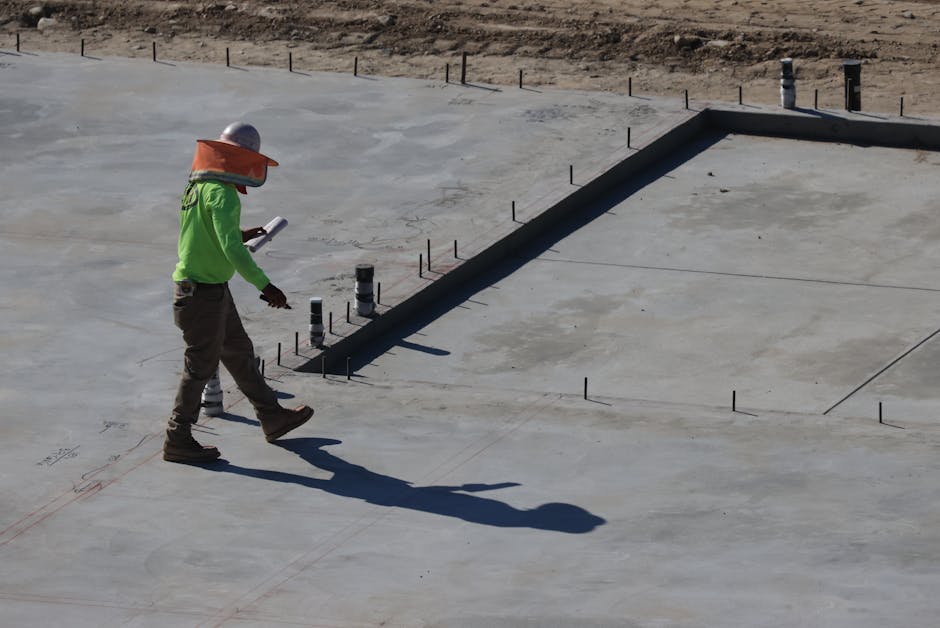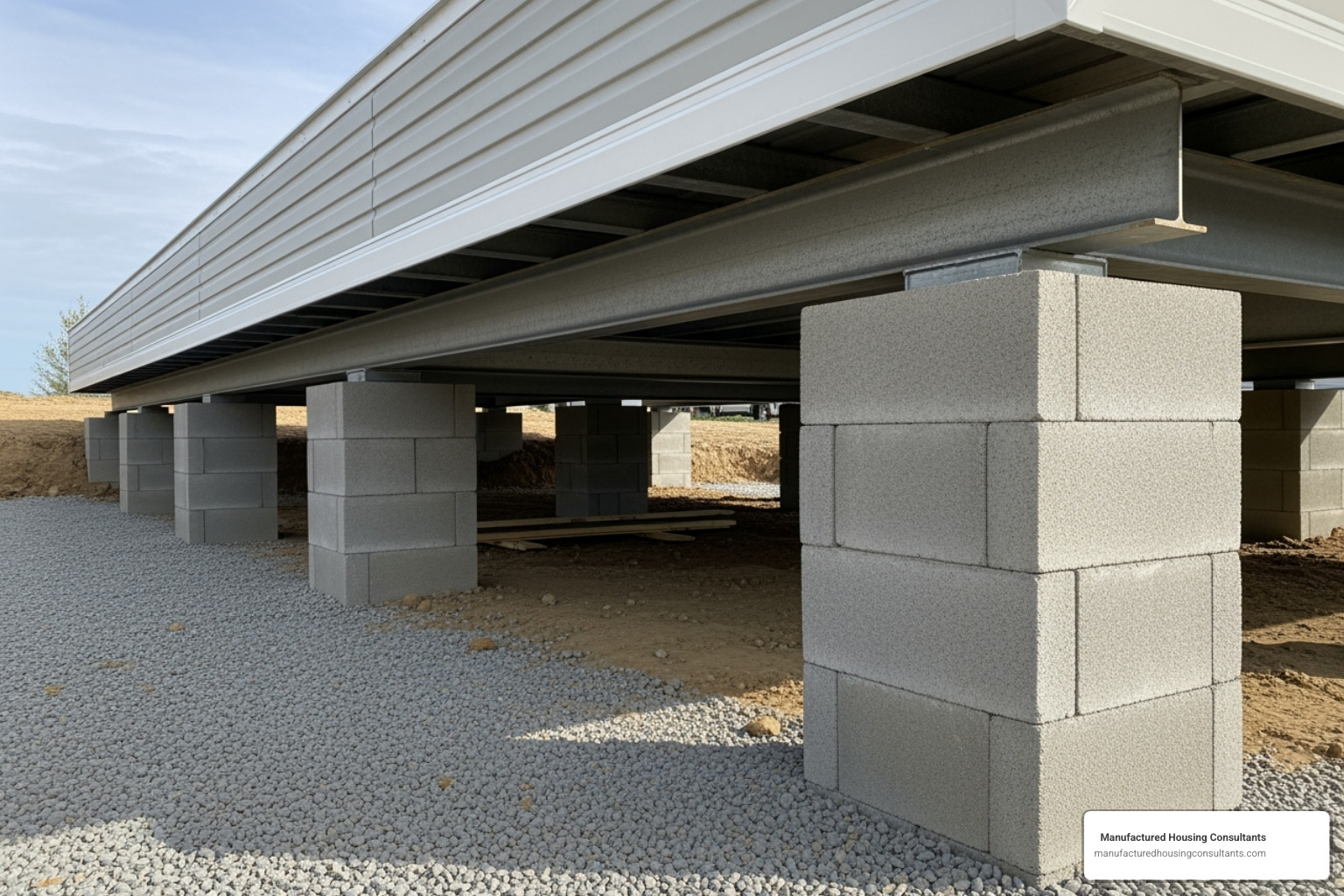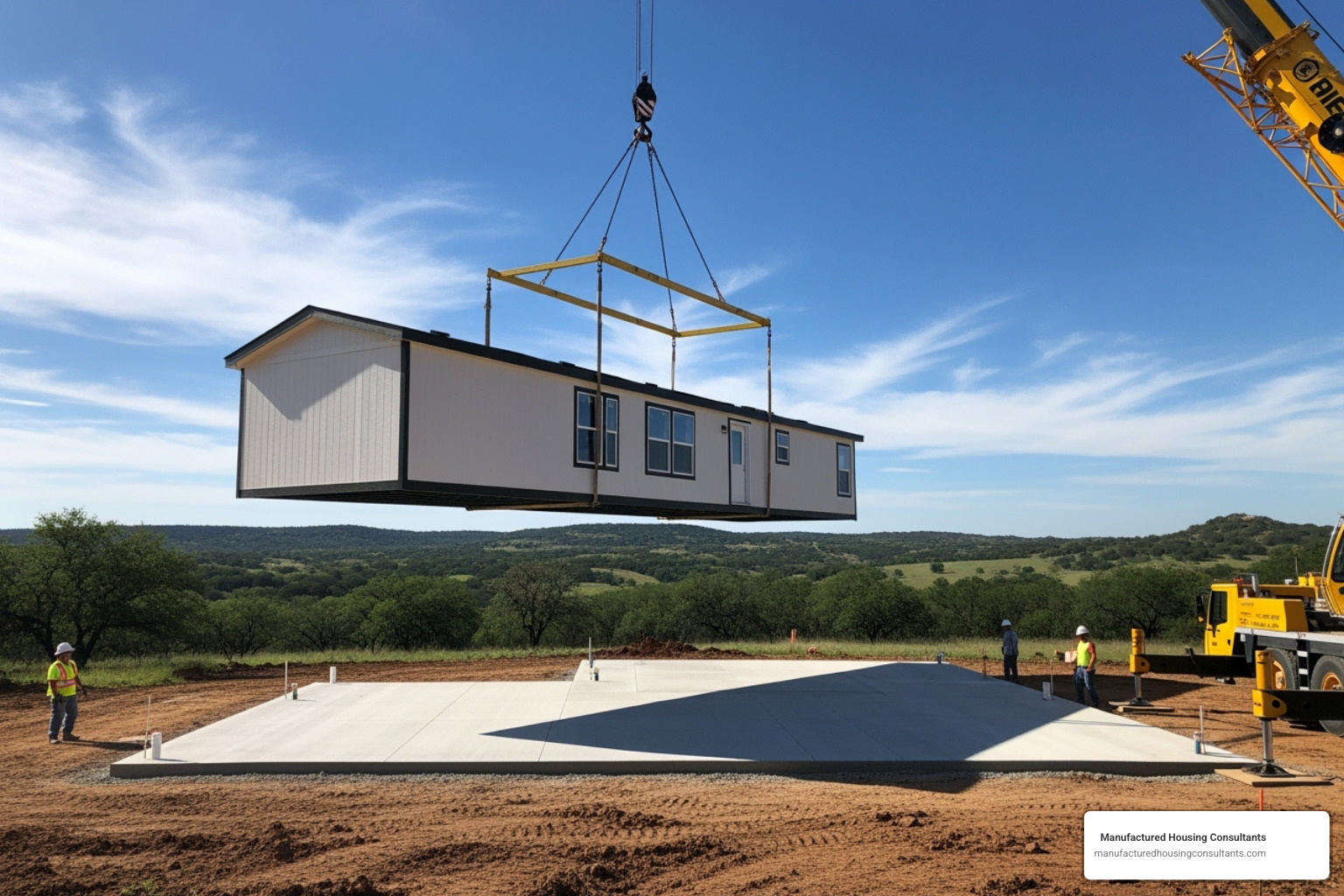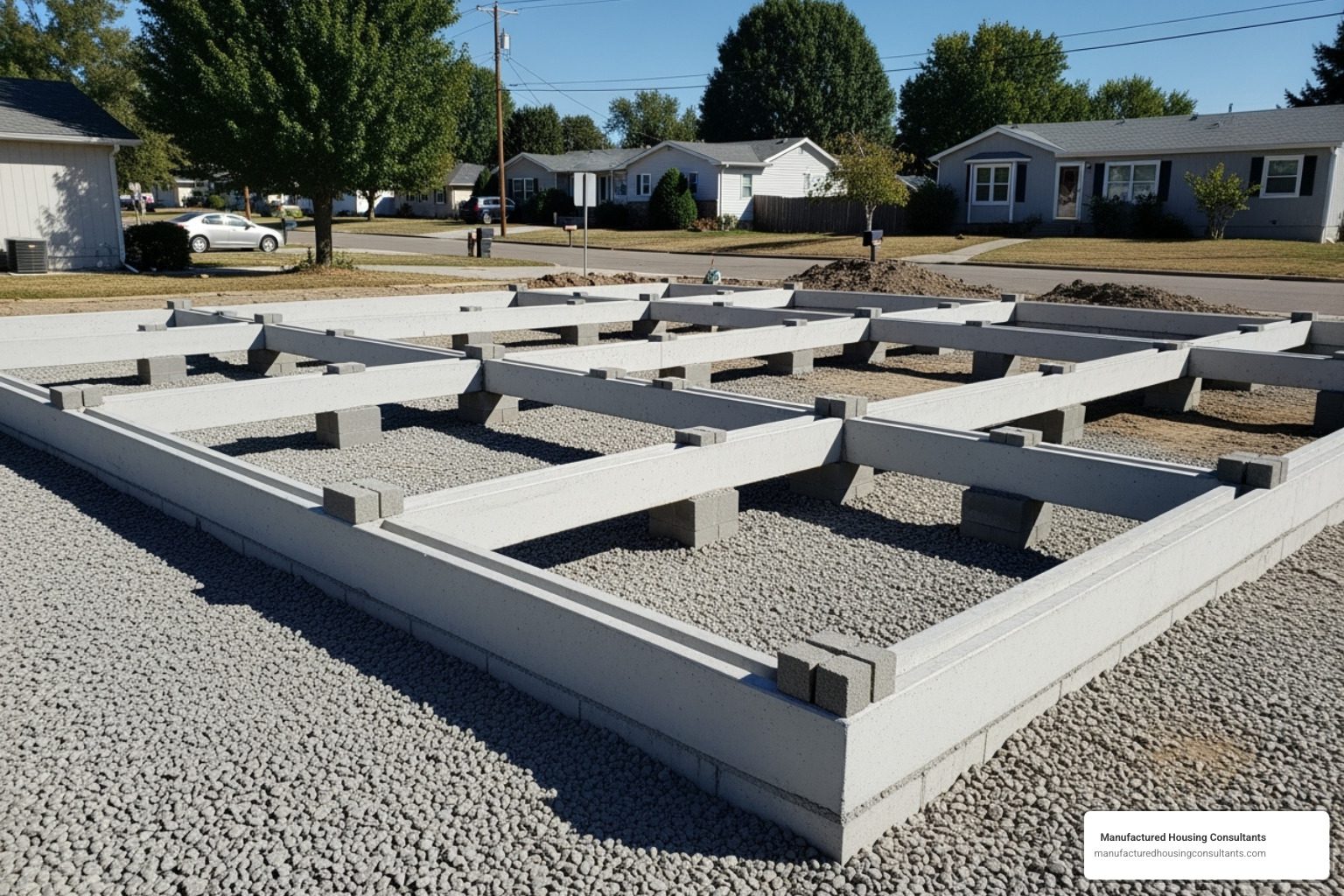Why Your Mobile Home’s Foundation is a Critical Choice
A foundation for mobile home installation determines your home’s stability, longevity, and value. The right choice protects your investment from shifting, moisture, and weather, while also being crucial for financing and resale.
Your foundation choice also dictates your home’s legal classification. A permanent foundation, which meets HUD standards by being fixed to the land with durable materials, classifies your home as real property. This makes it eligible for conventional, FHA, and VA mortgages, leading to better appreciation and resale value. In contrast, a non-permanent foundation classifies the home as personal property (or chattel), often limiting financing to loans with higher interest rates and shorter terms.
For our customers in San Antonio, Von Ormy, and the surrounding Texas communities, this selection is even more critical. Our region’s expansive clay soils, heavy rainfall, and severe weather demand foundations that can withstand extreme conditions. For buyers in our service areas, understanding these options is key to balancing upfront costs with long-term stability and value.
A Guide to Mobile Home Foundation Types and Costs
Choosing the right foundation for mobile home is one of the most critical decisions you’ll make. It determines safety, legal status, financing, and long-term value. Foundations fall into two categories: permanent (classifying the home as real property) and non-permanent (limiting financing and resale value). For more on the differences between home types, see our guide on What’s Difference Manufactured Homes vs Mobile Homes?.
Let’s review the common foundation types and how they perform under the unique challenges in our San Antonio service area.
Floating Foundations: Slabs & Runners
These foundations sit on the ground and are best for flat, stable terrain.
Slab Foundation
A slab is a solid concrete pad poured onto a level site. Your home sits directly on this platform.
- Cost: $4,000 – $9,000
- Pros: Excellent stability, quick installation, and a strong barrier against pests. When insulated, it helps with temperature regulation in hot Texas summers.
- Cons: Requires perfectly flat ground, and utility repairs can be difficult as pipes are embedded in the concrete. In Texas, proper site drainage is essential to prevent water from pooling at the base.

Runner Foundation
Runners are concrete strips poured along the length of the home, typically under the main load-bearing walls.
- Cost: $2,000 – $8,000
- Pros: Often the least expensive option with minimal excavation and faster installation.
- Cons: Offers limited protection against pests, moisture, and extreme weather. They often don’t qualify as permanent foundations, which impacts financing and resale value. For much of Texas, with its humidity and unstable soils, this is not an ideal long-term choice. For these reasons, this is not a foundation type that Manufactured Housing Consultants installs.
Raised Foundations: Piers, Pits & Crawl Spaces
These foundations lift the home off the ground, creating space underneath for utility access and moisture management.
Pier and Beam Foundation
This system supports the home on concrete piers resting on footings, creating a crawl space.
- Cost: $1,000 – $2,000
- Pros: One of the most affordable permanent options. The crawl space allows easy access to plumbing and electrical systems. It adapts well to sloped terrain and lifts the home above potential floodwaters.
- Cons: The open space can attract pests without proper skirting. Piers can settle over time, especially in Texas’s expansive clay soils, potentially requiring re-leveling.
Pit Foundation
A pit foundation involves excavating a shallow area to set the home lower to the ground, creating a crawl space.
- Cost: $2,000 – $6,000
- Pros: Gives the home a more traditional, site-built look. It provides crawl space access for utilities and can qualify as a permanent foundation.
- Cons: The excavated pit is a flood risk without excellent drainage—a major concern during Texas downpours. It requires more excavation than a pier system.
Crawl Space Foundation
This uses concrete walls and footers to create an enclosed, well-protected space under the home.
- Cost: $6,000 – $15,000
- Pros: Offers superior pest and moisture protection compared to open pier systems. The enclosed space improves energy efficiency and typically qualifies as a permanent foundation, boosting financing options and resale value.
- Cons: More expensive than pier or pit foundations. Poor drainage can lead to flooding in the crawl space, so professional installation is critical.

Permanent Options: Basements & Screw Piles
These are the most robust solutions, offering maximum stability and permanence.
Basement Foundation
A full-depth excavation creates a complete underground level, much like a traditional home.
- Cost: $12,000 – $25,000+
- Pros: Significantly increases resale value by adding usable living space. It offers the best structural support and protection from extreme weather, including Texas storms.
- Cons: This is the most expensive and time-consuming option. In areas with high water tables or heavy rain, exceptional waterproofing is required to prevent flooding. Please note that Manufactured Housing Consultants does not offer basement foundation construction.
Screw Pile Foundation
Large steel posts (helical piles) are screwed deep into the ground to anchor the home.
- Cost: Comparable to or slightly more than slab foundations.
- Pros: Extremely fast installation with minimal ground disturbance. They excel in poor soil conditions, like the soft or sandy soils found in parts of Texas, and resist frost heave.
- Cons: Requires specialized equipment and installers. The piles are not aesthetic and require skirting. They do not create storage or utility space underneath the home. As this requires specialized contractors, this is not a service we provide.
For more details on manufactured homes and setup, see our guide: Mobile Homes Everything You Need to Know.
Key Considerations for Your Foundation for Mobile Home
Choosing the right foundation for mobile home goes beyond a simple list. It’s about understanding how the choice impacts your financing, long-term value, and ability to meet state and federal requirements, especially for families in our service areas of San Antonio and Von Ormy. For more details, our guide offers additional insights: Manufactured Home Foundation Types.

The Impact on Financing and Resale Value
Your foundation choice is critical to your financial future. To be treated as real property (like a site-built house), your home needs a permanent foundation that meets HUD guidelines. This is a non-negotiable requirement for most FHA, VA, and conventional loans.
Without a HUD-compliant permanent foundation, you’ll likely be limited to chattel loans (personal property loans), which typically have higher interest rates and shorter terms. A home classified as real property appreciates better and is easier to sell because future buyers can also access favorable financing. We help clients steer these options from the start: Finance Manufactured Home on Land.
An engineer’s certification is a crucial step, confirming your foundation meets all HUD structural and safety requirements. This documentation is your proof of a stable, safe home and is required for most government-backed loans. You can find the official standards in the Permanent Foundations Guide for Manufactured Housing.
Choosing the Best Foundation for Texas
Texas’s unique climate and soil demand special attention when selecting a foundation for mobile home.
- Weather Challenges: Along the Gulf Coast, foundations need robust anchoring to resist hurricane-force winds. In flood-prone areas, raised foundations (pier and beam, crawl space) are beneficial. Across the state, proper site drainage is your first line of defense against heavy rainfall.
- The Soil Challenge: Much of central and south Texas, including the San Antonio area, has expansive clay soils. These soils swell when wet and shrink when dry, which can crack concrete and destabilize homes. A professional soil test is essential before building. Solutions include deep-drilled piers or screw piles that anchor below the active soil layer. Learn more about evaluating land here: Buying Land for Mobile and Manufactured Homes Part 1.
When planning your budget, the cheapest option today may lead to costly repairs tomorrow. Investing in a robust foundation suited for Texas conditions is a wise long-term decision.
Installation, Costs, and Meeting HUD Requirements
Proper installation is key to a long-lasting foundation.
- Site Preparation: This starts with clearing and grading the land to ensure water flows away from the home. Soil testing and utility planning are also critical first steps. We offer comprehensive Our Site Preparation Services to ensure this is done right.
- Leveling and Anchoring: Once the home is set, it must be perfectly leveled to prevent issues like sticking doors and structural stress. In Texas, anchoring is vital. Steel tie-down straps connect the home’s frame to ground anchors, securing it against high winds.
Typical Costs and Timelines
Costs and timelines vary based on location, soil, and home size. The table below provides general estimates for a variety of foundation types. It is important for our customers to know that while we can advise on all options, our direct installation services focus on the most common and effective permanent foundations for the San Antonio region: pier and beam, slab, and crawl space/pit systems. We do not offer installation for runner, basement, or screw pile foundations.
| Foundation Type | Average Cost Range | Typical Installation Time |
|---|---|---|
| Pier and Beam | $1,000 – $2,000 | 1-3 days |
| Slab | $4,000 – $9,000 | 3-7 days |
| Basement | $12,000 – $25,000 | 2-4 weeks |
| Pit / Crawl Space | $2,000 – $15,000 | 1-2 weeks |
| Runner | $2,000 – $8,000 | 2-5 days |
| Screw Pile | $4,000 – $10,000+ | 1-3 days |
These are averages; we provide detailed estimates for our clients in the San Antonio area to ensure there are no surprises.
Conclusion: Building Your Texas Dream on Solid Ground
Choosing the right foundation for mobile home is the cornerstone of your investment. This decision impacts your safety during Texas storms, your financing options, and the long-term value of your home. A properly installed permanent foundation transforms your manufactured home into real property, opening the door to better loans and higher resale value.
In Texas, with our unique soil and weather challenges, making the right choice is paramount. Whether it’s a cost-effective pier and beam system in Von Ormy or a robust slab foundation in San Antonio, the groundwork you lay today secures your family’s future. While other options like basements or screw piles exist, we focus on providing the foundation types best suited for our region’s needs and do not offer those specialized services.
At Manufactured Housing Consultants, we help Texas families in our San Antonio service area build on solid ground. Our expertise covers everything from site preparation to final installation, ensuring your foundation meets all HUD requirements. Your home deserves a foundation as strong as your dreams.

Let us help you lay the groundwork for your Texas dream. With our guaranteed lowest prices and delivery anywhere in Texas, we’re ready to guide you every step of the way. A home built to last starts from the ground up.




